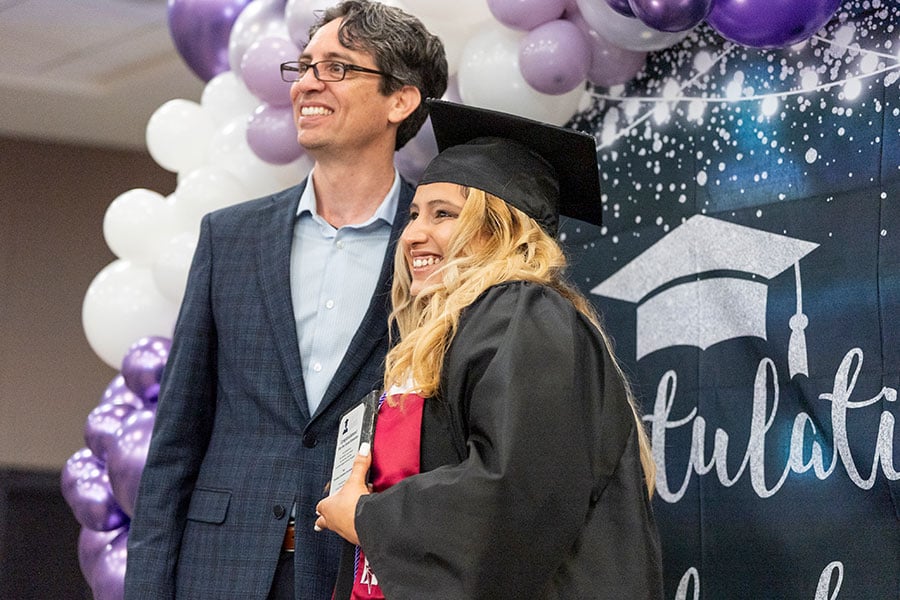Success in the first degree: CCFW’s Stay the Course program helps struggling college students graduate

Michael Iglio, CEO and president of Catholic Charities Fort Worth, poses for a photo with one of the 2024 Stay the Course graduates on June 3, 2024 at Tarrant County College Trinity River Campus. (NTC/Juan Guajardo)
FORT WORTH — The first time Samantha Alford enrolled in college, the high school graduate was married and pregnant with her first child. Despite having a scholarship to pay for tuition, the young mother’s time as an undergraduate in 2000 was short-lived.
“I was in a domestic violence marriage and all the things that come with that, so I stopped going,” the 44-year-old remembered.
Twenty-one years later, Alford, now divorced with grown children, resurrected her dream of earning a degree with the help of Stay the Course (STC).
“Going back to school was challenging, but they showed me how to stay focused on my goal,” admitted Alford, a class of 2024 graduate with a degree in substance abuse and mental health counseling.
The Fort Worth resident is one of 64 Stay the Course clients graduating in May and August with an associate’s degree from Tarrant County College.

Their achievements were recognized at a June 3 ceremony at the college’s downtown river campus. A Catholic Charities Fort Worth program offered in partnership with TCC, Stay the Course helps low-income students overcome personal, non-academic barriers that often prevent them from completing their education. Helping individuals achieve careers with a living wage is one of the ways CCFW hopes to end systemic poverty.
“We know the key to moving out of poverty is securing a job that pays a living wage, and to get that job, you need an education, degree, or certificate,” Cindy Casey, head of CCFW client services told graduates and guests at the graduation ceremony. “Our education pathway programs like Stay the Course are designed to help students from all walks of life navigate non-academic barriers to complete their educational goals and increase earnings.”
The STC program pairs participants with a navigator who encourages setting goals and guides them through money or family situations that could impact success in college. In addition to case management, financial assistance is available up to $1,500 for unexpected expenses.
“The biggest obstacle for our students is transportation and childcare,” explained Shannon Leonard, the Stay the Course CCFW program manager. “Many times, they have to decide can I afford childcare or school? Do I have reliable transportation? We try to mitigate some of those obstacles.”
Stay the Course case managers can refer clients to employment providers or assist with other challenges like gaining U.S. citizenship, a driver’s license, or housing.
“We really try to address the whole student and not just their academic needs,” Leonard asserted.
Launched in 2013 at the downtown campus, enrollment in STC is now available at all five TCC locations including Connect Campus — an option that offers flexible learning through online and weekend classes.
“We meet those students entirely online,” the administrator added. “We had to shift our thinking during the pandemic and that really opened the doors for us to reach more students.”
Since its inception at TCC, Stay the Course has served more than 2000 clients and boasts an exceptional success rate.
“Eighty-six percent of our students passed all their classes last semester,” the program director said proudly. “We often hear from our graduates years later. They are thankful for the support and listening ear of the navigator who helped them achieve an education and gainful living-wage employment.”
Although most STC students pursue degrees related to health professions, Victoria Cardona chose a different path. The 21-year-old is transferring to Texas Christian University where she will study accounting on a full tuition scholarship.

“I want to be educated about finances so I can help my family and community,” said Cardona, whose parents immigrated from Mexico. “Money issues have always been a source of fear in my family. My mother and father work hard but still struggle. That scared me into knowing I needed something different.”
After graduating from Castleberry High School, the straight-A student received no guidance when it came to filling out college applications or financial aid forms.
“My obstacle was money,” she said. “A scholarship would cover my education, but there was no help with household expenses and groceries.”
Cardona joined Stay the Course a year ago and quickly advanced through the program.
“My navigator helped me set goals and checked on my progress,” said the first-generation graduate, explaining how she learned to pay off debt by tackling one bill at a time. “She motivated and pushed me. Stay the Course showed me an education and financial stability are attainable.”
Cardona’s story underscores how education pathway programs, sponsored by Catholic Charities, play a role in ending poverty.
Community colleges are affordable and exemplary places of higher learning that help students accomplish goals, Casey pointed out.
“But so many who start community college never finish,” she continued. “So we partnered with the University of Notre Dame and created a program that pairs students with navigators to help them overcome the institutional and personal obstacles that frequently prevent them from completing their education.”
Casey called earning a degree “a life-altering accomplishment.” Michael Iglio, CEO and president of Catholic Charities Fort Worth echoed the sentiment.
“I’m in awe of each one of you,” he said, addressing the graduates. “You’ve taken such a difficult path and achieved something truly remarkable. Tonight, we celebrate your accomplishments and dedication to education.”
